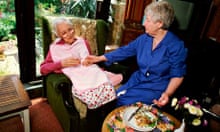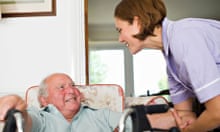There is a broad consensus that the NHS needs to transform the way it delivers care to meet the challenge of an ageing and rising population. A greater emphasis on prevention, service quality and patient satisfaction is the prescription that most agree is needed to make the NHS sustainable. The challenge now is to move from ideas to delivery.
The second Independence Day forum, which is being held in the House of Commons on Thursday – the first was in November – provides the opportunity for a constructive debate about how we can deliver a transformed health and social care system.
The health select committee recently called for large scale change to be made to how care is provided, if we are to meet the needs of the UK's ageing population at a time of increased cost pressures. Sir David Nicholson, chief executive of NHS England, has pointed out that "the NHS has to adapt to survive".
But the need to change and to integrate health and social care presents a huge conundrum for policymakers, given that such reforms remain "notoriously" controversial and unpopular with the public.
A capped budget for the NHS and pressures on social care spending, combined with a growing ageing population, means that the sectors need to either lower the average cost per patient or ration services. We need to find the "sweet spot" which improves health outcomes, quality and patient satisfaction at a lower cost. Independence Day is about how the NHS and care systems can work to reduce spending and, in parallel, improve patient experience.
Plans for hospital closures and further integration are seldom welcomed by the public. The public's connection with "my hospital" is very powerful and not entirely unreasonable, and hospital closure can feel like replacing something with nothing.
This reaction to reform demonstrates the scale of the challenge ahead in terms of changing attitudes and perceptions to new models of care. Even when reforms would enhance quality and reduce risk they remain universally unpopular. It is clear that often what the public think "good" health and social care look like can be very different from the reality.
On the road to 2015, all political parties will need to tackle this conundrum if there is going to be a seismic shift away from traditional thinking about how health and social care are delivered. The Independence Day hearing provides a forum to debate these key questions, seek solutions and shape opinion. Key players from the health and social care sectors will meet in parliament to examine what "good" or "better" looks like for the public in terms of improved quality in health and social care. It will also explore how to change the public's mindset and appetite for change to the NHS.
The hearing will be chaired by Victoria Macdonald, Channel 4's health and social care correspondent, and will take evidence from experts across the sector, such as Alexandra Norrish, deputy director of NHS policy and strategy at Department of Health, and Pam Creaven, director of services at Age UK.
The event will explore public perception of reforms and the reluctance to embrace change in the sector. It will also aim to establish the scale of the task in terms of winning the argument for change.
The recommendations and findings from each hearing will be submitted to government and other people of influence in a report and national conference later this year, with a view to helping to shape future thinking and public attitudes on how health and social care are delivered.
Prof Phil Hope is a director of Improving Care and former minister for care services
Why not join our social care community? Becoming a member of the Guardian Social Care Network means you get sent weekly email updates on policy and best practice in the sector, as well as exclusive offers. You can sign up – for free – online here










